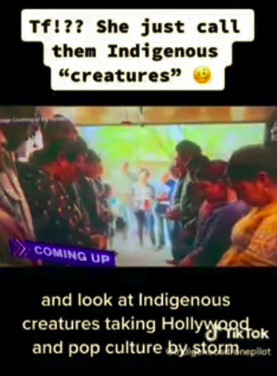
- Details
- By Darren Thompson
NEW YORK — During news coverage on Native American Heritage Month, ABC reporter Kyra Phillips misspoke and referred to Indigenous people as “Indigenous creatures” on ABC News’ streaming channel on Thursday morning.
“Celebrating Native American Heritage Month, when we come back we’ll take a look at Indigenous creatures taking Hollywood and pop-culture by storm,” Phillips mistakenly said on Thursday's broadcast.
The mistake has been corrected, and the news company hasn’t issued an explanation to the error, which was captured and published on TikTok by user @indigenousdronepilot.
“I was taken back when I first seen it, but not surprised,” Brooke Waukau (Johnson), whose TikTok handle is @indigenousdronepilot, told Native News Online. “For outsiders looking in, that misuse of words could look like a harmless mistake, but for Indigenous people it is a reminder of the mistrust and broken relationship we have with the media.”
As of press time, the video has had more than 730,000 views, thousands of shares, and social media is abuzz with memes, comments, and posts.
Popular social media handle Injun Comedy said in a post on Facebook, “We’re not ‘something else’ any more, we’re ‘Indigenous creatures’ now.” The popular social media group has more than 225,000 followers and has already posted links to merchandise that have the text “Indigenous creatures.”
Native Hoop Magazine posted on its social media today, defending the ABC News story about Native American Heritage Month. “That clip of ABC News calling us indigenous creatures is taken way out of context,” Native Hoop Magazine wrote on its Facebook on Friday. It shared a link to the network’s publication of the story and its title includes “Native American creators.”
The ABC story was about Native American people involved in the creation of several hit shows such as Reservation Dogs and the movie Prey.
“We don’t want them to honor us once a year for Native American Heritage Month,” said Waukau, who’s also a MMIW Task Force Coordinator for the Wisconsin Department of Justice. “We want them to do their job all year round and run stories on our missing men, women, and children.”
CORRECTION: A previous version of this article erroneously named 20/20 anchor Amy Robach as the anchor who referred to Native Americans as "Indigenous creatures." The ABC reporter who made the reference is Kyra Phillips.
More Stories Like This
Native News Weekly (August 25, 2024): D.C. BriefsNavajo Nation Secures $285 Million in Federal Broadband Funding to Connect Thousands of Homes
Oral History Project Announces 18th Stop in Denver, Colorado: NABS Continues Preserving Critical Stories Across Indian Countr
Next on Native Bidaské: Protecting Legacy Before It’s Forgotten with the National Native American Hall of Fame
Zuni Youth Enrichment Project Wins $25,000 National Award to Strengthen Long-Term Support for Zuni Youth
Help us defend tribal sovereignty.
At Native News Online, our mission is rooted in telling the stories that strengthen sovereignty and uplift Indigenous voices — not just at year’s end, but every single day.
Because of your generosity last year, we were able to keep our reporters on the ground in tribal communities, at national gatherings and in the halls of Congress — covering the issues that matter most to Indian Country: sovereignty, culture, education, health and economic opportunity.
That support sustained us through a tough year in 2025. Now, as we look to the year ahead, we need your help right now to ensure warrior journalism remains strong — reporting that defends tribal sovereignty, amplifies Native truth, and holds power accountable.
 The stakes couldn't be higher. Your support keeps Native voices heard, Native stories told and Native sovereignty defended.
The stakes couldn't be higher. Your support keeps Native voices heard, Native stories told and Native sovereignty defended.
Stand with Warrior Journalism today.
Levi Rickert (Potawatomi), Editor & Publisher
